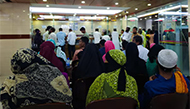Real-Name System Sought for Internet Users
Staff Reporter
The ruling Uri Party may introduce a system forcing Web surfers to use their real names online to curb Internet crime, especially libel, a top party official said Tuesday.
Rep. Chung Sye-kyun, the party’s floor leader, said, ``We will positively consider introducing the ``real-name system’’ as the government is also studying a new regulation and a great number of Internet users have expressed their support for it in recent surveys.’’
Chung said cyber crimes have steadily increased and the number of such crimes this year is estimated at as much as 10 times that in 2001.
However, Chung also expressed concern over the possible side effects of the mandatory use of real names on the Internet, as it is feared it could infringe on the freedom of expression, stressing the need to consider all possible consequences.
The ruling party is likely to finalize its stance on the issue within this month after a series of meetings and discussions with the public and the government, party officials said.
Recent surveys conducted by major local Internet Web portals have shown that a majority of Internet users support the disclosure of user identities on the Web.
According to a survey of 7,909 Internet users by Naver (www.naver.com), the nation’s largest Web portal, 65 percent of those polled supported using real names on the Web, while 32 percent opposed it. The survey was conducted between June 13 and July 3.
Another survey of 1,631 people by Yahoo Korea (www.yahoo.co.kr), which was conducted over the same period, showed an even higher percentage. Eighty percent backed the new anti-defamation scheme, dwarfing the 18 percent that objected to it.
An increasing number of people have been calling for the introduction of the real-name system, citing a series of recent defamation cases, such as ``Entertainers’ X-File,’’ a 113-page computer file containing personal information and unconfirmed rumors regarding 125 Korean celebrities.
The controversial file, which began spreading through the Internet in mid-January, was compiled in November by Dongseo Research to be used as an informal reference at the request of Cheil Communications, the largest advertising company in the country.
Early last month, two pictures of a woman holding a puppy and an old man cleaning up after her dog in a subway train became the topic of enraged Internet users.
Tens of thousands of comments criticizing the lady for her irresponsibility were posted on Web sites.
A few days later, however, some other commuters, who witnessed the situation, posted comments defending the lady, pointing out the awkward situation she faced and criticizing the ``online witch-hunt.’’
According to the National Police Agency, the number of Internet crimes reported to police last year is estimated to be over 200,000, up from 165,119 in 2003 and 118,868 in 2002.
things@koreatimes.co.kr
스마터리빙
more [ 건강]
[ 건강]이제 혈관 건강도 챙기자!
[현대해운]우리 눈에 보이지 않기 때문에 혈관 건강을 챙기는 것은 결코 쉽지 않은데요. 여러분은 혈관 건강을 유지하기 위해 어떤 노력을 하시나요?
 [ 건강]
[ 건강]내 몸이 건강해지는 과일궁합
 [ 라이프]
[ 라이프]벌레야 물럿거라! 천연 해충제 만들기
 [ 건강]
[ 건강]혈압 낮추는데 좋은 식품
[현대해운]혈관 건강은 주로 노화가 진행되면서 지켜야 할 문제라고 인식되어 왔습니다. 최근 생활 패턴과 식생활의 변화로 혈관의 노화 진행이 빨라지고
사람·사람들
more많이 본 기사
- 백악관 “미네소타 이어 他민주당 州들… 1
- 오픈AI 직원, 올해 평균 150만 달러치 주식 받아…역대 빅테크 최고
- “메타, 사기광고 규제 피하려 검색결과 조작…대응지침도 마련”
- 트럼프, 집권2기 첫 법안 거부권… ‘보복성’ 권한 행사 논란
- “美서 학생 백신 접종률 급감”… ‘백신의 정치화’ 여파
- 제야의 종으로 ‘붉은 말의 해’ 시작… “행복 오는 2026년 되길”
- 낸시랭, 사채 빚 15억 떠안았다..오열 고백 “좀비떼처럼 뜯어 먹어”
- ■ 제언 / 한인회 사태 신속한 해결을
- 말리·부르키나파소 “미국인 오지마”…美입국 금지에 맞불
- 숙명여대 뉴저지 동문회 송년회
- ‘상간녀 의혹’ 숙행, 리액션만 간신히 건졌다..무대는 통편집
- 시애틀 다운타운 상권 명암 엇갈려...의류할인점 ‘로스’ 폐점, 노스트랙 이전
- 美, 韓정통망법에 ‘검열·빅테크 규제’ 우려…외교갈등 비화하나
- 폭설 속 산행 비극… 마운트 볼디서 3명 조난 사망
- 코스트코행 40만달러 랍스터 도난당해...‘스푸핑, 위장트럭’까지…워싱턴주 등 미 화물절도 극성
- ‘첫 무슬림 뉴욕시장’ 맘다니, 취임식때 쿠란에 손 얹고 선서
- ‘억’ 소리 나는 ‘개념 부부’..신민아♥김우빈·손예진♥현빈
- “추신수는 지울 수 없는 발자취 남겼다” 美 야구기자, 명예의 전당 투표서 ‘CHOO 선택’ 이유 밝혔다
- 새해에도 성금 물결 이어져 ...이수잔ㆍS독자 1,000달러씩. 동덕여고 500달러
- 조세호 ‘조폭 연루설’ 털고 빠른 복귀 수순.. ‘도라이버’ 시즌4 합류
- 미국내 한인 225만명…다소 줄어...재외동포 181개국에 700만명, 2년새 7만5,000명 감소
- 시애틀 최고 레스토랑이 코스요리를 5달러에?...캔리스 개업 75주년 축하행사로 1950년 가격 제공 ‘화제’
- “10년간 모든 이민 전면 금지?” 황당 주장
- 원·달러 환율… 연평균 기준 ‘역대최고’ 마감
- LA 북쪽 테혼 카지노서 하룻새 10만불 ‘연속 잭팟’
- 지방세 공제한도 1만→4만달러로 상향
- 4명 군 입대했지만..세븐틴, 13人 완전체 회식 현장 포착
- ‘백두산 호랑이’ 대가족 포착… “매우 희귀한 일”
- ‘헤비급 복서’ 조슈아 구사일생 동승자 2명 사망사고에도 경상
- 한국팀 뛸 곳인데… 강력범죄 ‘충격’
- [연말 기획] 한국계 혼혈들 두각… 각 분야에서 ‘맹활약’
- 신년 연휴 폭풍우… 비 3인치 온다
- ‘최하 평점+부상 교체’ 황희찬 대위기, 울버햄튼 무려 ‘19경기 무승+압도적 꼴찌’... 강등권 탈출 ‘빨간불’
- 22개주서 생굴 먹고 살모넬라균 감염
- 불체자 의심 메디케이드 정보 공유 허용
- 샴페인, 마지막 날과 첫날을 위하여
- ‘케네디’가 또 비극 외손녀 희귀암 별세
- 알고보니 ‘완전식품’인 고구마의 놀라운 효능
- “라면, 못 끊겠다면 ‘이거’라도 넣어라”
- ‘아듀~ 2025!’… 희망찬 새해로
- 가주 판매 간 소고기 ‘이콜라이’ 오염
- [인터뷰-문경환 한인회장] “캔자스, 이민자들에 제2의 기회의 땅”
- [한인 은행장 신년사 통해 본 비전과 경영 목표] “끊임없는 변화와 혁신으로 안정적 성장 도모”
- 브라이언트팍서 외국인 관광객 묻지마 칼부림
- 안성기, 1월 1일 생일 하루 앞두고 심정지 상태 병원 이송..쏟아지는 응원
- 장수성인데이케어, 송년 파티
- 한동훈 “가족이 尹부부 비판 글 올린… 2
- “치매에 치즈가 좋대서 맨날 먹었는데”… 고지방 주의
- 이명석 회장, “공금횡령^불법행위 한적 없다“
- [조지 F. 윌 칼럼] 저무는 2025년에 안도의 한숨
1/5지식톡

-
 미 육군 사관학교 West Poin…
0
미 육군 사관학교 West Poin…
0https://youtu.be/SxD8cEhNV6Q연락처:wpkapca@gmail.comJohn Choi: 714-716-6414West Point 합격증을 받으셨나요?미 육군사관학교 West Point 학부모 모…
-
 ☝️해외에서도 가능한 한국어 선생님…
0
☝️해외에서도 가능한 한국어 선생님…
0이 영상 하나면 충분합니다!♥️상담신청문의♥️☝️ 문의 폭주로 '선착순 상담'만 진행합니다.☎️ : 02-6213-9094✨카카오톡ID : @GOODEDU77 (@골뱅이 꼭 붙여주셔야합니다…
-
 테슬라 자동차 시트커버 장착
0
테슬라 자동차 시트커버 장착
0테슬라 시트커버, 사놓고 아직 못 씌우셨죠?장착이 생각보다 쉽지 않습니다.20년 경력 전문가에게 맡기세요 — 깔끔하고 딱 맞게 장착해드립니다!장착비용:앞좌석: $40뒷좌석: $60앞·뒷좌석 …
-
 식당용 부탄가스
0
식당용 부탄가스
0식당용 부탄가스 홀세일 합니다 로스앤젤레스 다운타운 픽업 가능 안녕 하세요?강아지 & 고양이 모든 애완동물 / 반려동물 식품 & 모든 애완동물/반려동물 관련 제품들 전문적으로 홀세일/취급하는 회사 입니다 100% …
-
 ACSL 국제 컴퓨터 과학 대회, …
0
ACSL 국제 컴퓨터 과학 대회, …
0웹사이트 : www.eduspot.co.kr 카카오톡 상담하기 : https://pf.kakao.com/_BEQWxb블로그 : https://blog.naver.com/eduspotmain안녕하세요, 에듀스팟입니다…
케이타운 1번가
오피니언
 정숙희 논설위원
정숙희 논설위원샴페인, 마지막 날과 첫날을 위하여
 조지 F·윌 워싱턴포스트 칼럼니스트
조지 F·윌 워싱턴포스트 칼럼니스트 [조지 F. 윌 칼럼] 저무는 2025년에 안도의 한숨
 김동찬 시민참여센터 대표
김동찬 시민참여센터 대표 [미국은 지금] 책임 있는 자본 없으면 커뮤니티 미래도 없다
 성영라 수필가 미주문협 부이사장
성영라 수필가 미주문협 부이사장 [수요 에세이] 다시, 제자리로 돌아와서
 신경립 / 서울경제 논설위원
신경립 / 서울경제 논설위원 [만화경] 경영자의 ‘문제적’ 사과
 문태기 OC지국장
문태기 OC지국장 한인 정치력 업그레이드 기대
 민경훈 논설위원
민경훈 논설위원세계 역사를 바꾼 동물
 박홍용 경제부 차장
박홍용 경제부 차장 한인사회가 주목해야 할 새해 경제
 박영실 시인·수필가
박영실 시인·수필가 [화요칼럼] 피드백
1/3지사별 뉴스

지방세 공제한도 1만→4만달러로 상향
2026년 새해에도 뉴욕과 뉴저지 한인들의 일상에 크고 작은 영향을 미치는 다양한 규정과 법규가 새롭게 바뀌게 된다. 당장 1일부터 뉴욕시 최…
■ 사고- 한동대·뉴욕한인청소년센터 국제여름캠프

2025 워싱턴지역 10대 뉴스
다사다난했던 2025년이 하루만 남겨둔 채 역사의 저편으로 저물고 있다. 올해의 가장 큰 뉴스는 트럼프 2기 행정부 출범과 함께 몰아친 이민 …
내년 1월부터 달라지는 MD 법안들

셀폰 위치추적, 납치된 딸 살렸다… ‘부모 통제’ 기능 활용
스마트폰에서 자녀의 위치를 확인할 수 있는 ‘부모 통제(parent control)’ 위치 추적 기능의 도움으로 납치됐던 청소년들이 잇달아 구…
[새해부터 이렇게 달라진다] 최저임금 또 오르고… 유급 병가는 더 확대

오늘 하루 이 창 열지 않음 닫기 




















































.png)


댓글 안에 당신의 성숙함도 담아 주세요.
'오늘의 한마디'는 기사에 대하여 자신의 생각을 말하고 남의 생각을 들으며 서로 다양한 의견을 나누는 공간입니다. 그러나 간혹 불건전한 내용을 올리시는 분들이 계셔서 건전한 인터넷문화 정착을 위해 아래와 같은 운영원칙을 적용합니다.
자체 모니터링을 통해 아래에 해당하는 내용이 포함된 댓글이 발견되면 예고없이 삭제 조치를 하겠습니다.
불건전한 댓글을 올리거나, 이름에 비속어 및 상대방의 불쾌감을 주는 단어를 사용, 유명인 또는 특정 일반인을 사칭하는 경우 이용에 대한 차단 제재를 받을 수 있습니다. 차단될 경우, 일주일간 댓글을 달수 없게 됩니다.
명예훼손, 개인정보 유출, 욕설 등 법률에 위반되는 댓글은 관계 법령에 의거 민형사상 처벌을 받을 수 있으니 이용에 주의를 부탁드립니다.
Close
x